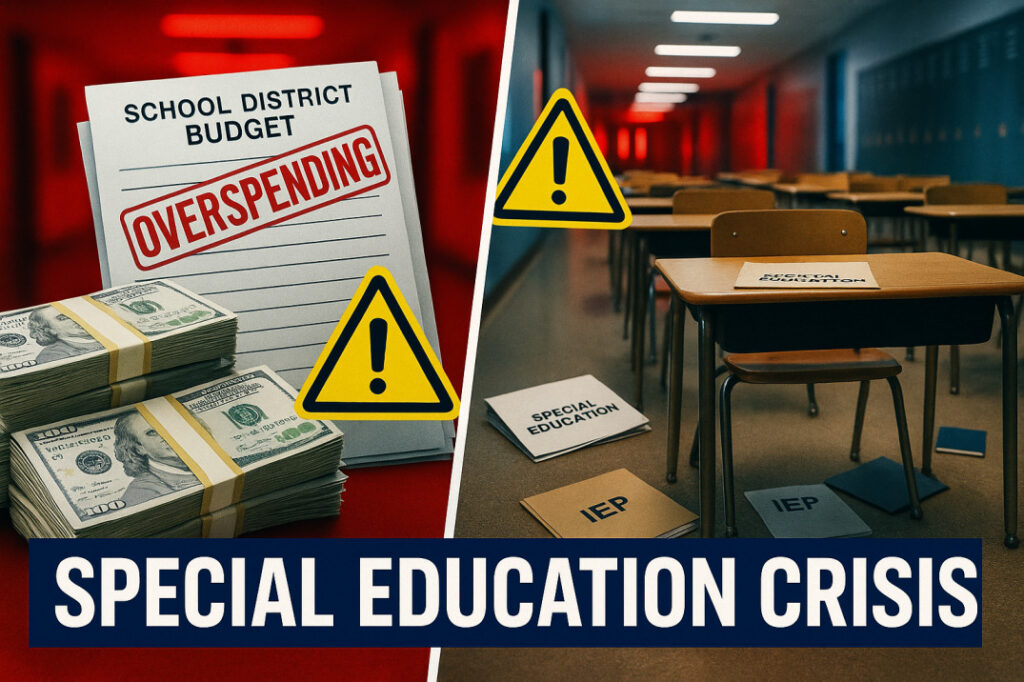Hayward Unified Special Education Crisis: Years of Overspending Leave Students Without Required Services

Federal monitoring findings ignored for four years while department burns through taxpayer money with zero accountability.
The most damning revelation from Hayward Unified School District’s July 30, 2025 board meeting wasn’t just about budget shortfalls. It was about a Special Education department so broken that students aren’t receiving legally required services despite years of massive overspending that has pushed the entire district toward fiscal collapse.
Special Education Department: A Complete System Failure
Board Clerk Austin Bruckner Carrillo delivered the harsh truth that HUSD officials have been avoiding for years: “The overspending and lack of checks and balances were in our SpEd department. I want to make sure we’re being realistic about the serious concerns in the SpEd department. Complete overhaul in that department.”
This isn’t bureaucratic restructuring. This is acknowledgment of systematic failure in the department responsible for serving HUSD’s most vulnerable students. The Special Education crisis has become so severe that it’s driving the district’s overall fiscal emergency while simultaneously failing the very students it’s supposed to serve.
The department has operated without basic fiscal controls, burning through taxpayer dollars while students with disabilities go without required Individualized Education Program (IEP) services. This represents both a fiscal disaster and a civil rights violation that could expose the district to federal sanctions and lawsuits.
Federal Compliance Failures Dating Back to 2020
Superintendent Jason Wu-Fernandez admitted the scope of federal compliance failures: “We have past findings that go back to 2020-21 school year. We’re all working hard on those findings. Some related to process and protocols that we have to put in place, some related to funding.”
Four years of unaddressed federal monitoring findings in Special Education represents gross negligence by district leadership. These aren’t minor paperwork issues. Federal monitoring findings in Special Education typically involve:
- Failure to provide required services outlined in student IEPs
- Improper evaluation and placement procedures
- Inadequate staffing and service delivery
- Misuse of federal Special Education funding
- Violation of procedural safeguards for students with disabilities
Each day these findings remain unaddressed, HUSD risks losing millions in federal Special Education funding while exposing taxpayers to potential lawsuits from families whose children have been denied legally required services.
Parent Testimony Exposes Service Denials
Parent Araceli Orozco delivered devastating testimony about the real-world impact of Special Education mismanagement: “Spending in special ed, money has not been well spent. I know for a fact that some of our children don’t even get evaluated. They don’t get services that they have in IEPs or translation in their IEPs. Our SpEd kids didn’t even get the services they needed.”
This testimony reveals the cruel irony of HUSD’s Special Education crisis. The district has overspent dramatically in this department while simultaneously failing to provide basic services that students are legally entitled to receive. Families are paying twice: once through excessive spending that’s bankrupting the district, and again through the denial of services their children desperately need.
The lack of translation services mentioned by Orozco is particularly concerning in a district with significant English Language Learner populations. Students with disabilities who also have language barriers face double discrimination when the district fails to provide required translation services.
The Collaboration Crisis
Board members identified a fundamental breakdown in collaboration between Special Education and other departments that has contributed to both fiscal irresponsibility and service failures. This lack of coordination has created:
- Duplicate spending across departments with no oversight
- Gaps in service delivery where departments assume others are providing support
- Inability to track actual costs versus budgeted amounts
- No accountability measures for spending effectiveness
The Special Education department has operated as an isolated entity, making spending decisions without coordination with Business Services or Human Resources. This has led to hiring decisions, contract approvals, and service agreements that nobody was tracking or evaluating for effectiveness.
Staffing Chaos and Student Impact
The Special Education crisis has created staffing instability that directly impacts student services. The July 30 meeting agenda included multiple teacher reassignments and involuntary transfers, many related to Special Education positions.
When Special Education staff positions are constantly changing, students with disabilities lose continuity of services that are critical for their educational progress. IEP goals become impossible to achieve when the staff responsible for implementing them are constantly being reassigned or leaving the district.
The fiscal mismanagement has also made it difficult to recruit qualified Special Education professionals. Teachers and specialists don’t want to work in a department known for chaos and instability, creating a vicious cycle where service quality continues to decline.
Legal and Financial Liability
HUSD’s Special Education failures expose taxpayers to significant legal and financial liability:
Federal Sanctions: Continued non-compliance with federal monitoring findings could result in loss of federal Special Education funding, which represents millions of dollars annually.
Due Process Complaints: Families can file due process complaints when districts fail to provide required IEP services, potentially resulting in costly compensatory education awards.
Civil Rights Violations: Systematic denial of services to students with disabilities constitutes civil rights violations that could trigger federal investigations and enforcement actions.
Class Action Lawsuits: The scope of service denials described by parent testimony suggests potential class action liability for systematic violations of student rights.
The Path to Special Education Reform
Board members have committed to a “complete overhaul” of the Special Education department, but taxpayers deserve specifics about what this means:
- Immediate audit of all Special Education spending and contracts
- Comprehensive review of IEP compliance for all students
- Implementation of checks and balances to prevent future overspending
- Coordination protocols between Special Education and other departments
- Timeline for addressing all outstanding federal monitoring findings
- Accountability measures for department leadership
The February 2026 fiscal solvency deadline makes Special Education reform even more urgent. The district cannot achieve fiscal stability while one department continues operating without basic financial controls.
Accountability for Leadership
The Special Education crisis didn’t develop overnight. Years of administrative negligence have created a department that fails students while wasting taxpayer money. Parents and taxpayers deserve answers about:
- Which administrators were responsible for oversight of Special Education spending?
- How did federal monitoring findings go unaddressed for four years?
- What specific steps will ensure students receive required IEP services?
- Who will be held accountable for the systematic failures?
The next board meeting on August 27, 2025 must include detailed presentations about Special Education reform plans and timelines for compliance with federal requirements.
Hayward’s students with disabilities deserve better than a broken system that takes their money while denying their services. Taxpayers deserve better than a department that operates without accountability or fiscal responsibility.
Sources: HUSD 07_30_25 Board of Education Meeting – 07-30-2025 – Meeting Minutes.pdf













